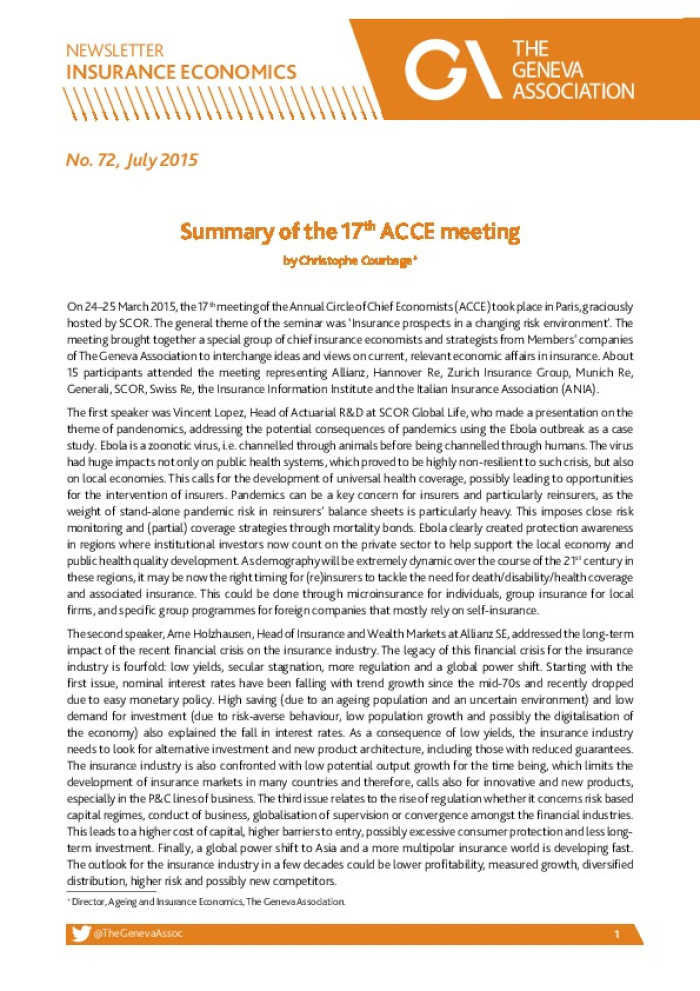Summary of the 17th ACCE meeting
Article from Insurance Economics Newsletter No. 72

1 FINANCIAL SBILITY AT ION NEWSLETTER INSURANCE ECONOMICS Summary of the 17th ACCE meeting by Christophe Courbage+ On 24?25 March 2015, the 17th meeting of the Annual Circle of Chief Economists (ACCE) took place in Paris, graciously hosted by SCOR. The general theme of the seminar was ?Insurance prospects in a changing risk environment?. The meeting brought together a special group of chief insurance economists and strategists from Members? companies of The Geneva Association to interchange ideas and views on current, relevant economic affairs in insurance. About 15 participants attended the meeting representing Allianz, Hannover Re, Zurich Insurance Group, Munich Re, Generali, SCOR, Swiss Re, the Insurance Information Institute and the Italian Insurance Association (ANIA). The first speaker was Vincent Lopez, Head of Actuarial R&D at SCOR Global Life, who made a presentation on the theme of pandenomics, addressing the potential consequences of pandemics using the Ebola outbreak as a case study. Ebola is a zoonotic virus, i.e. channelled through animals before being channelled through humans. The virus had huge impacts not only on public health systems, which proved to be highly non-resilient to such crisis, but also on local economies. This calls for the development of universal health coverage, possibly leading to opportunities for the intervention of insurers. Pandemics can be a key concern for insurers and particularly reinsurers, as the weight of stand-alone pandemic risk in reinsurers? balance sheets is particularly heavy. This imposes close risk monitoring and (partial) coverage strategies through mortality bonds. Ebola clearly created protection awareness in regions where institutional investors now count on the private sector to help support the local economy and public health quality development. As demography will be extremely dynamic over the course of the 21 st century in these regions, it may be now the right timing for (re)insurers to tackle the need for death/disability/health coverage and associated insurance. This could be done through microinsurance for individuals, group insurance for local firms, and specific group programmes for foreign companies that mostly rely on self-insurance. The second speaker, Arne Holzhausen, Head of Insurance and Wealth Markets at Allianz SE, addressed the long-term impact of the recent financial crisis on the insurance industry. The legacy of this financial crisis for the insurance industry is fourfold: low yields, secular stagnation, more regulation and a global power shift. Starting with the first issue, nominal interest rates have been falling with trend growth since the mid-70s and recently dropped due to easy monetary policy. High saving (due to an ageing population and an uncertain environment) and low demand for investment (due to risk-averse behaviour, low population growth and possibly the digitalisation of the economy) also explained the fall in interest rates. As a consequence of low yields, the insurance industry needs to look for alternative investment and new product architecture, including those with reduced guarantees. The insurance industry is also confronted with low potential output growth for the time being, which limits the development of insurance markets in many countries and therefore, calls also for innovative and new products, especially in the P&C lines of business. The third issue relates to the rise of regulation whether it concerns risk based capital regimes, conduct of business, globalisation of supervision or convergence amongst the financial industries. This leads to a higher cost of capital, higher barriers to entry, possibly excessive consumer protection and less long- term investment. Finally, a global power shift to Asia and a more multipolar insurance world is developing fast. The outlook for the insurance industry in a few decades could be lower profitability, measured growth, diversified distribution, higher risk and possibly new competitors. No. 72, July 2015 + Director, Ageing and Insurance Economics, The Geneva Association. @TheGenevaAssoc INSURANCE ECONOMICS